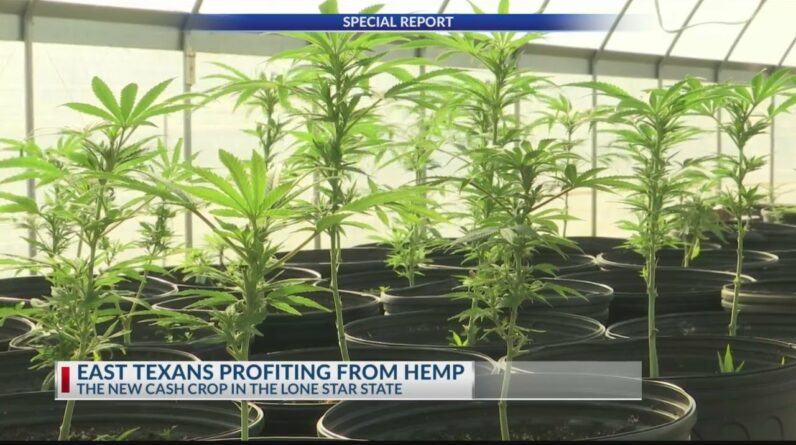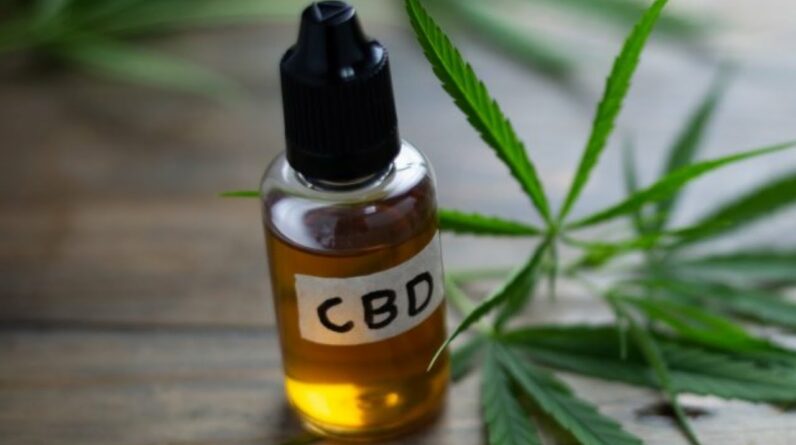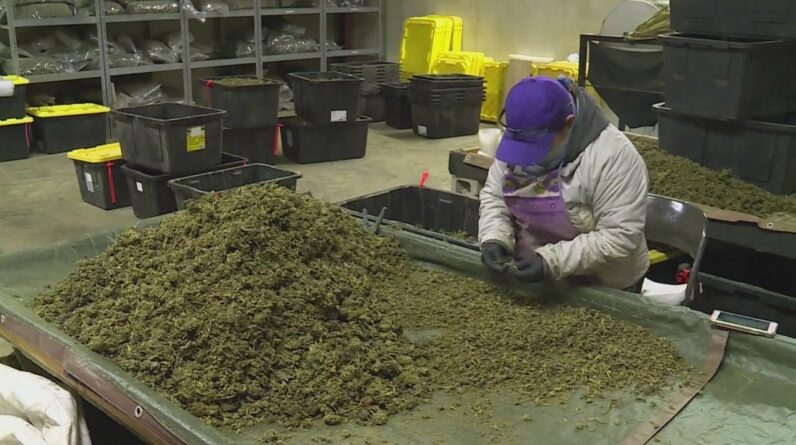You’ve probably heard of THC, but have you met THCV? It’s THC’s less intense cousin. It’s found in tiny amounts in some cannabis plants and is gaining attention. People are looking into it for weight loss1. THCV has effects like making you less hungry and controlling blood sugar1. It’s getting popular in natural health circles as ‘diet weed’2. Before jumping into THCV, it’s important to know what it does. Research is still going on about its benefits.
Key Takeaways
- Explore THCV’s appetite-suppressing properties and its potential for weight loss1.
- Understand THCV’s unique position as a lesser psychoactive alternative to THC, and its role in higher doses1.
- Learn about THCV’s place within the cannabis plant family and how sativa strains from Africa are rich in this compound1.
- Discover why THCV products are gaining attention for their ability to increase energy and focus, positioning them as a natural choice in alternative medicine1.
- Review the implications of early research on THCV’s potential to regulate blood sugar and assist in diabetes management2.
Understanding THCV and Its Place in the Cannabis Family
The Cannabis sativa world is full of unique compounds. One of these, THCV, is a lesser-known cannabinoid that’s getting more attention. It’s different from others and has effects that both researchers and users find interesting.
What sets THCV apart from THC? It’s all in the molecules. THCV and THC interact differently with the body’s cannabinoid receptors. THCV lacks two carbon atoms present in THC. This changes how it affects cannabinoid receptors. Even with these differences, THCV still connects to brain receptors. This could mean it has uses without the high THC gives.
What Sets THCV Apart from THC
THCV is fascinating because of its structure. Unlike THC, which can make you hungry, THCV might reduce appetite. This is why scientists are studying it for weight control and metabolic disorders.
The Molecular Similarities and Distinctions
Research into cannabis compounds shows even tiny changes matter. THCV’s slight difference from THC makes it stand out. This makes it very interesting for studies on how it works with the endocannabinoid system.
Legal Implications and the Farm Bill
The Farm Bill in the U.S. has affected THCV’s legality. It’s played a key role in research and the sale of cannabis products, like those from hemp3. This Bill created different rules for hemp-derived compounds, which are legal at the federal level, unlike others. State laws also play a part in the legality of these products, making the industry more complex.
In summary, as cannabis product laws change, understanding THCV is vital. The Farm Bill changes have made this even more important. This knowledge helps use these compounds safely and effectively in the U.S.
The Appetite Suppression Properties of the THCV Diet

In the vast world of cannabis products, you might find THCV interesting. Current research highlights its health benefits, especially its appetite-suppressing properties. These could lead to new methods in weight control4.
THCV isn’t like THC, its well-known relative, because it doesn’t produce a high5. In small doses, THCV can block the CB1 receptor, reducing the urge to snack6. This interaction with our endocannabinoid system sets THCV apart4. In the UK and Europe, THC levels above 0.2% are illegal. This makes THCV’s non-psychoactive effect even more appealing5.
THCV is a rare cannabinoid found in small amounts in some cannabis strains and CBD oils. Extracting it often requires supercritical CO2 methods, which are both efficient and costly due to the low availability of plants5. Still, people praise THCV for its benefits, including more energy, weight loss, and better blood sugar control, shown in a 2020 study5. This means you could include it in a healthy lifestyle that mixes good food and exercise5.
When talking about appetite suppression, we must recognize the work of researchers looking into THCV. Animal studies show it might reduce hunger, improve insulin sensitivity, and help with fat loss. This could mean less chance of gaining weight and lower risk of metabolic syndrome6. However, research on humans is still ongoing. Scientists are trying to confirm these positive results and better understand how THCV works4.
To conclude, if you’re interested in trying a cannabinoid to help manage your appetite, THCV might be what you’re missing. The ongoing research into its appetite suppression effects is promising. It might significantly change our approach to diet and metabolic health soon.
Potential of THCV in Weight Management and Obesity
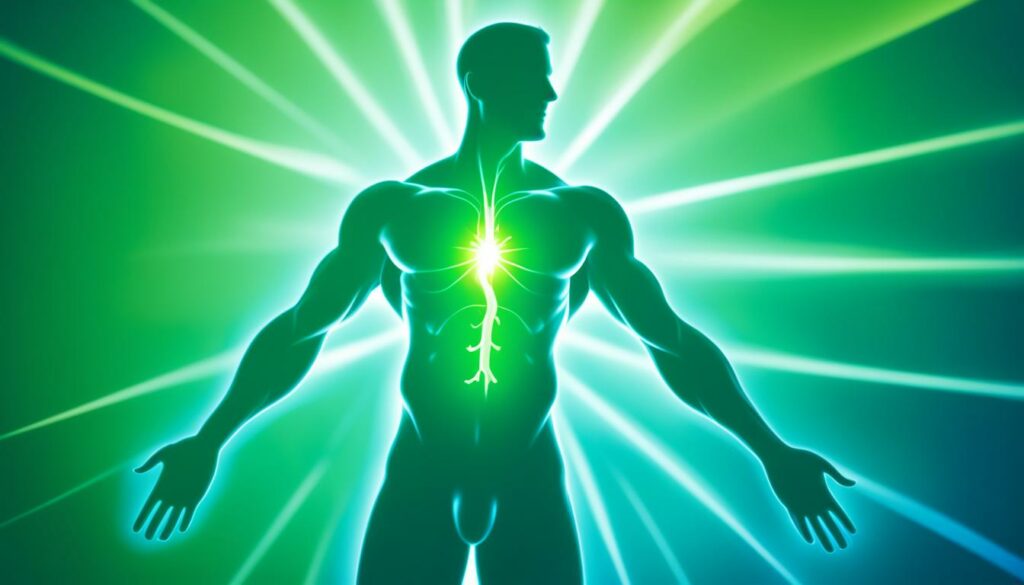
New research on THCV is making waves in weight control and obesity battle. This special cannabinoid is known for reducing hunger. It also helps with metabolism and energy management. Now that 33 states and the District of Columbia7 allow medical cannabis, we can explore THCV’s health benefits more.
Current Research on THCV’s Role in Metabolism
Studies are connecting THCV to better energy use in our bodies. It seems to cut hunger, helping with diet control and weight loss. Experiments on rodents show THCV leads to eating less and losing weight7. This suggests THCV might help humans too, especially in high doses. Such research makes THCV a promising natural option for fighting obesity.
How THCV May Curb Hunger and Promote Satiety
THCV might help people feel full and eat less, which is great for those dealing with obesity. In one study, THCV reduced blood sugar levels and upped adiponectin, which helps with glucose and fat processing7. Some had doubts about THCV’s ability to cut food intake7. Yet, the general view is optimistic about its role in weight control.
Upcoming research will look into cannabinoids for obesity at two doses8. These studies will check how well and safely they work for metabolic health. They’ll look at everything from body weight to how our brains react to food8. This broad approach shows the exciting direction of THCV research.
| Factor | Impact of THCV & THC |
|---|---|
| Appetite Suppression | THCV decreases appetite and increases satiety levels7 |
| Metabolism | Up-regulates energy metabolism, influencing weight management7 |
| Glycemic Control | Improves fasting glucose levels in type 2 diabetes patients7 |
| Weight Reduction | Associated with lower BMI, less obesity, and decreased risk of diabetes in cannabis users8 |
THCV could change how we manage weight and fight obesity. It’s important to follow state rules, like Louisiana’s non-smoking law for cannabis7. With growing interest in cannabinoid treatment, THCV leads the way. It could totally change how we think about metabolic health and wellness.
THCV’s Unique Effects on Blood Sugar and Insulin Sensitivity
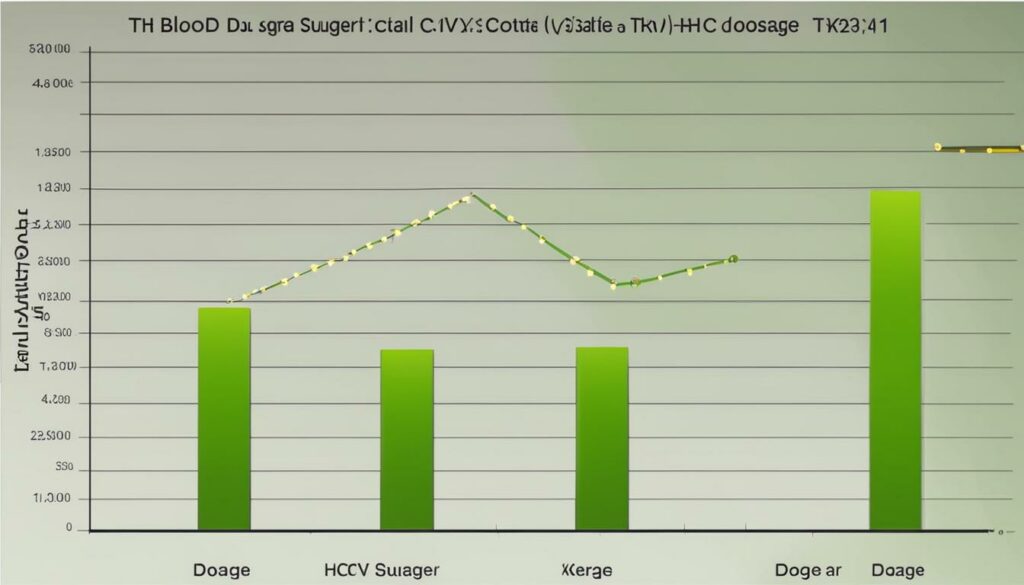
Diving into the world of cannabinoids reveals THCV’s unique role. It particularly stands out for its impact on blood sugar levels and insulin sensitivity. Research is uncovering its potential benefits for those with insulin resistance and glucose intolerance.
THCV could change the future of diabetes treatment. Initial studies in rodents suggest THCV boosts energy and lowers glucose intolerance in certain mice9. This points to both immediate energy benefits and long-term health improvements.
Insights from Preliminary Studies and Rodent Research
THCV has shown promising results beyond lowering glucose intolerance. In certain mice, it enhanced glucose tolerance and greatly improved insulin sensitivity9. Its dual action presents it as a beneficial compound for enhancing insulin response.
Also, THCV has beneficial effects at the cellular level. Even though it didn’t always change plasma lipids, it improved insulin signaling in certain cells9. This indicates THCV’s potential in fighting insulin resistance.
Implications for Type 2 Diabetes Treatment
With type 2 diabetes on the rise worldwide, finding effective treatments is crucial. THCV shows promise not just in rodents but potentially in humans too, for regulating blood sugar and reducing insulin resistance10. This could lead to major improvements in diabetes care.
Though more human studies are needed, current research on THCV offers hope. It suggests THCV might enhance life quality for those with type 2 diabetes. It could offer a new way to manage blood sugar and resist insulin issues.
Could THCV Be an Antipsychotic Alternative? Evaluating the Evidence

In the search for new mental health treatments, THCV shows promise. Its unique impact on the brain may help with panic attacks and anxiety. This compound could offer hope to those in need.
THCV’s Interactions with the Brain’s Chemistry
THCV interacts with the brain in special ways, affecting cannabinoid receptors. These receptors are key in mental balance. Research is looking at THCV as a possible new antipsychotic11.
Analyzing the Potential for Reducing Panic Attacks and Anxiety
More people are looking for alternative mental health treatments. THCV could be less harsh than traditional meds, especially for panic attacks. It might bring peace12.
Research into cannabinoids like THCV is uncovering their potential for mental health. Exploring THCV’s effects isn’t just for science. It could lead to better, kinder treatments for mental health issues1112.
THCV’s Anti-Inflammatory Benefits: Early Findings

The world of alternative medicine is always changing. Recently, studies have shown the anti-inflammatory effects of Tetrahydrocannabivarin (THCV). This compound is found in small amounts in some cannabis strains. Scientists studying animals have found that THCV can significantly reduce inflammation. This makes it a potential option for new treatments9.
Researchers looked at how different amounts of THCV affect inflammation. In mice with certain health issues, THCV helped improve their conditions without changing their food intake or weight. It even increased their energy levels for a short time. These results suggest THCV could play a role in managing metabolic health9.
THCV also seems to improve insulin function in cells that have become resistant9. This discovery builds on earlier findings. Unlike other compounds, THCV has unique effects that could be useful in medicine. The research so far shows THCV might help with health problems caused by inflammation9.
In summary, more studies are needed to fully explore THCV’s benefits. But current research suggests it could be important for treating inflammation. THCV is proving to be a valuable addition to natural cannabinoid treatments. It could lead to better ways to manage diseases linked to inflammation92.
Dissecting the Psychoactive Properties of THCV at High Doses

The cannabis industry is growing fast, and so is the interest in cannabinoids like THCV. Unlike THC, THCV’s effects at high doses are milder but still psychoactive. This makes strains rich in THCV especially interesting. They could influence how we think with less intensity13.
THCV vs THC: The Psychoactive Divergence
THC is known for boosting dopamine in the brain, which makes us feel good. THCV, on the other hand, offers clear-headedness, particularly at high levels13. This difference means THCV could give users a lighter psychoactive experience. It differs from THC’s stronger feelings of intoxication.
How High-THCV Strains May Affect Cognitive Function
It’s crucial to understand how cannabinoids like THCV can change cognitive functions. High-THCV strains might improve concentration. They could help people get into a “flow” state, feeling fully engaged in what they’re doing13. While the exact effects are still being studied, high-THCV strains might boost productivity and sharpness mentally at larger doses.
| Cannabinoid | Psychoactive Effect | Impact on Cognitive Function | Typical Experience |
|---|---|---|---|
| THC | Potent, full-bodied “high” | Altered perception, euphoria | Intense, relaxation-inducing |
| THCV (High Doses) | Mild, mental-focused “buzz” | Enhanced focus, flow state | Moderate, stimulation-oriented |
THCV at high doses doesn’t affect our pleasure centers as much as THC does13. However, the growing curiosity in cannabinoids’ subtle effects suggests high-THCV strains may find their niche. The cannabis industry is evolving, offering products that focus more on mental boost than deep relaxation.
Exploring the Safety Profile of THCV: Tolerance and Side Effects
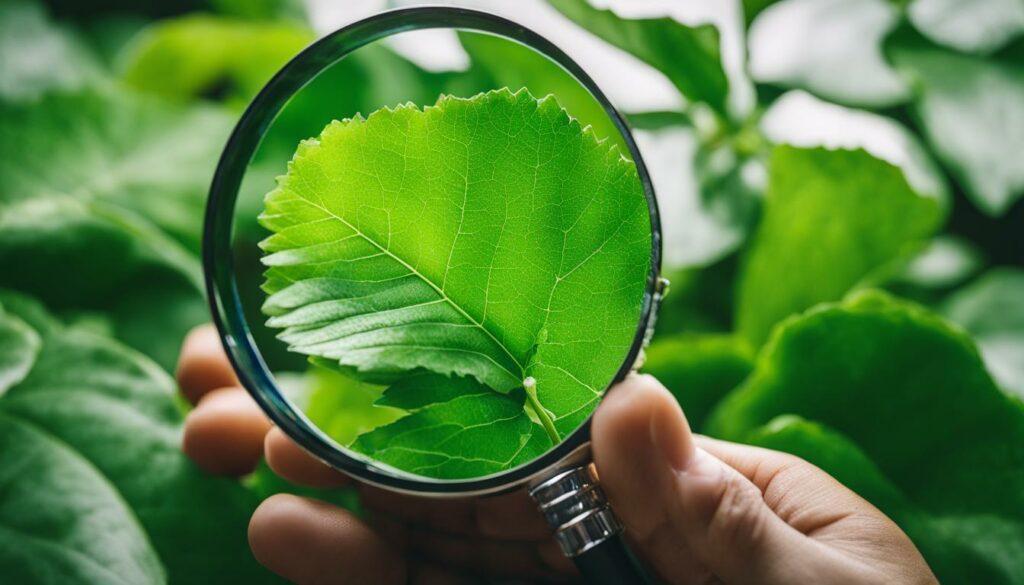
Understanding THCV’s safety is becoming more important as its popularity grows. THCV stands out as a as it offers less psychoactivity and fewer adverse effects at smaller doses14.
Low Doses and the Absence of Intoxicating Effects
THCV is unique because it lessens the psychoactive effects common with THC. At low levels, it’s not intoxicating, making it safer and less likely to cause tolerance issues14. THCV is great for those wanting benefits without much psychoactivity14.
What Consumers Should Know About THCV and Drug Tests
When it comes to drug tests, THCV’s presence might complicate results. THCV isn’t THC, but it could still be detected in screenings. This knowledge is vital since the legal status of THCV products varies widely14.
| THCV Attribute | Impact on Users | Consideration for Drug Tests |
|---|---|---|
| Low Psychoactivity at Minimal Doses | Decreases likelihood of intoxication and anxiety-related side effects14 | Potential to be flagged due to cannabinoid presence14 |
| Appetite Suppression | Supports weight management and reduced food intake without strong THC effects14 | Dependent on THCv concentrations within the product14 |
| Legal Status | Varies by state and source (hemp vs. marijuana-derived)14 | Legality can affect availability and permissible levels in screenings14 |
When adding THCV to your health routine, consider its THC effects, how your body handles tolerance, and the law. THCV offers a safer choice, but it’s essential to stay informed and consult professionals to make the most out of it.
User Experiences with THCV Products: Vapes, Oils, and Strains

People are exploring the world of cannabinoids, looking beyond the famous ones. THCV gummies and other products are getting popular. They are known for boosting energy levels and focus. These cannabis compounds provide a unique effect different from CBD products. The benefits are widely acknowledged by the cannabis community.
Reported Benefits for Energy Levels and Focus
THCV benefits are praised for enhancing vitality and mental clarity. Vape pens and oils with this natural cannabinoid are said to help focus and energy. This can improve productivity and wellbeing. Strains like Durban Poison, high in THCV, are noted for making senses sharper and boosting stamina.
Users report these effects, but they also note THCV doesn’t have some common cannabis side effects, like faster heart rate or poor coordination15. This makes THCV attractive for those wanting benefits without the downsides.
The Preference for Natural Cannabinoid Sources Like Durban Poison
People who love real, plant-based cannabis products often choose Durban Poison. This strain is rich in THCV. Many prefer natural cannabis for its unaltered benefits and authenticity. There’s a growing trend for products that are true to nature’s design.
The exploration of cannabinoids like THCV keeps the cannabis industry innovative. There’s a big audience looking for natural ways to enhance their lives.
Navigating the Legal Status of THCV in the United States
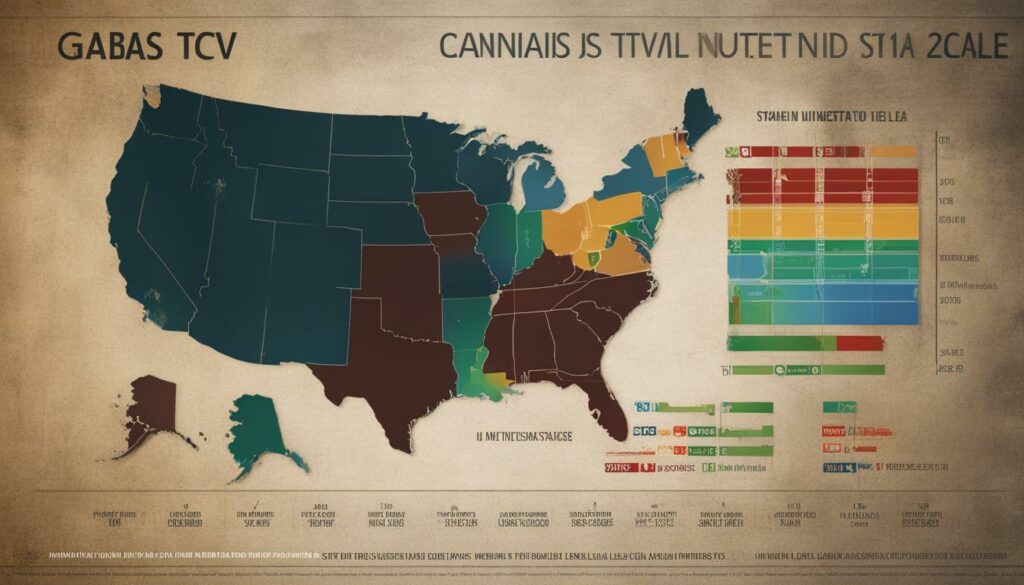
Understanding the legal side of cannabinoids is key for those involved in the industry. In the U.S., the mix of federal and state rules impacts the legality of cannabinoids like THCV. This depends on whether they come from hemp or marijuana.
Differentiating Between Hemp-Derived and Marijuana-Derived THCV
In 2018, the Farm Bill made a crucial distinction between hemp and marijuana by law16. It states that hemp and its products are legal if they contain under 0.3% THC. On the other hand, marijuana, with its higher THC levels, remains illegal under federal law17.
It’s important to know where THCV comes from. If it’s from hemp and meets THC rules, it’s legal across the U.S.16. But, if it’s from marijuana, laws vary by state due to its Schedule I status, which implies high abuse potential with no accepted medical use17.
Understanding State Laws and Compliance
The Farm Bill was a big step, but state laws add extra rules. States can limit the sale of hemp-based products, including THCV. Even though federal law may permit these, businesses must also follow state laws.
In recent years, the FDA warned companies about selling certain CBD items illegally16. This happened with some food and drink products in October 2022 and pain relief products in March 202116. These actions show the FDA’s focus on making sure products meet legal standards, a point stressed in July 201916.
The cannabinoid sector is both full of opportunities and challenges. Understanding both federal and state laws is crucial. This knowledge helps tap into the benefits of hemp-derived THCV and manage the complexities of marijuana-derived THCV.
| Date | FDA Action | Focus | Impact on Legal Status |
|---|---|---|---|
| December 2018 | FDA statement on the Farm Bill | Cannabis Compounds | Clarified hemp legality under federal law |
| June 2018 | Drug Approval | Medical Use | Indicated acceptance of cannabis-derived medicines |
| October 2019 | Warning to Company | Unapproved CBD Products | Highlighted need for industry compliance |
| October 2022 | Warning on CBD Products | Illegal Sale | Reaffirmed oversight on cannabinoid products |
Conclusion
THCV is gaining attention for its unique benefits in health and wellness. It shows promise for weight control and treating various conditions18. Studies suggest THCV can help reduce body fat and serum leptin levels18. This brings hope for new, cannabinoid-based treatments in the future.
THCV’s benefits may also include better blood sugar control and fighting inflammation1819. These could change how we treat diabetes and inflammatory diseases1819. Still, it’s crucial to seek medical advice before using THCV products. Research is ongoing to fully understand THCV’s effects on the human body.
THCV’s role in future treatments looks bright. Early studies are encouraging for those looking for new, effective therapies1918. They highlight the importance of cannabinoids in medical science. This points to a future with more personalized and preventive care based on natural compounds.
FAQ
What is THCV and how does it differ from THC?
Can THCV help with weight loss?
What are the possible benefits of THCV?
Does THCV have any psychoactive effects?
How does THCV influence insulin sensitivity and blood sugar levels?
Can THCV be used to treat anxiety or panic attacks?
What are some known anti-inflammatory effects of THCV?
Is THCV a legally approved substance in the United States?
What are the potential adverse effects of THCV?
Can using THCV products affect a drug test?
What should I consider before using THCV products for health-related purposes?
Are there certain cannabis strains that are higher in THCV?
Source Links
- https://www.businessinsider.com/thcv-diet-weed-claims-it-suppresses-appetite-without-high-2022-3
- https://www.ncbi.nlm.nih.gov/pmc/articles/PMC7819335/
- https://www.fda.gov/consumers/consumer-updates/what-you-need-know-and-what-were-working-find-out-about-products-containing-cannabis-or-cannabis
- https://circa1818.ca/thcv-the-diet-cannabinoid/
- https://www.therealcbd.com/en/thcv-oil-benefits/
- https://forgehemp.com/thcv-a-promising-cannabinoid-for-weight-loss-and-health/
- https://www.nature.com/articles/s41366-019-0334-z
- https://www.medscape.com/viewarticle/966836
- https://www.ncbi.nlm.nih.gov/pmc/articles/PMC3671751/
- https://www.leafly.com/news/cannabis-101/what-is-thcv-and-what-are-the-benefits-of-this-cannabinoid
- https://www.nature.com/articles/npp201119
- https://www.ncbi.nlm.nih.gov/books/NBK425767/
- https://www.medicalnewstoday.com/articles/317104
- https://neurogan.com/blogs/news/what-is-thcv
- https://www.cdc.gov/marijuana/what-we-know.html
- https://www.fda.gov/news-events/public-health-focus/fda-regulation-cannabis-and-cannabis-derived-products-including-cannabidiol-cbd
- https://www.frontiersin.org/journals/plant-science/articles/10.3389/fpls.2019.00697/full
- https://www.sciencedirect.com/topics/medicine-and-dentistry/tetrahydrocannabivarin
- https://www.ncbi.nlm.nih.gov/pmc/articles/PMC9070748/



